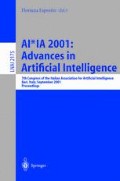Abstract
Previous work in model-based reasoninga nd in reasoning about action and change has shown that causal knowledge is essential to perform proper inferences about discrete changes in a system modeled by a set of logical or qualitative constraints.
In this work we show that causal information can also be conveniently used to greatly improve the efficiency of qualitative simulation, prunings purious behaviors and guiding the computation of the “successor” relation, yet maintainingt he ability to deal with ambiguous predictions. The advantages of the approach are demonstrated on test cases, including one from a real application, using a diagnostic engine based on a causaldirected constraint solver.
Access this chapter
Tax calculation will be finalised at checkout
Purchases are for personal use only
Preview
Unable to display preview. Download preview PDF.
References
F. Cascio, L. Console, M. Guagliumi, M. Osella, A. Panati, S. Sottano, and D. Theseider Dupré. Generatingon-board diagnostics of dynamic automotive systems based on qualitative models. AI Communications, 12(1,2):33–43, June 1999. Special issue on Model-Based Reasoning.
D. Clancy and B. Kuipers. Qualitative simulation as a temporally-extended constraint satisfaction problem. In Proc. AAAI 98, 1998.
A. Davenport and E. Tsang. An empirical investigation into the exceptionally hard problems. Proc. Workshop on Constraint-based Reasoning, pages 46–53, 1995.
Johan de Kleer and John Seely Brown. Qualitative physics based on confluences. Artificial Intelligence, 24:7–83, 1984. Also in Readings in Knowledge Representation, Brachman and Levesque, editors, Morgan Kaufmann, 1985, pages 88–126.
M. Denecker, D. Theseider Dupré, and K. Van Belleghem. An inductive definition approach to ramifications. Electronic Transactions on Artificial Intelligence, 2(1–2), 1998.
Yumi Iwasaki and Herbert A. Simon. Causality in device behavior. Artificial Intelligence, 29(1):3–32, 1986.
V. Kumar. Algorithms for constraint satisfaction problems: A survey. AI Magazine, 13(1):32–44, 1992.
Fangzhen Lin. Embracingcau sality in specifyingt he indirect effects of actions. In C.S. Mellish, editor, Proceedings of the International Joint Conference on Artificial Intelligence, pages 1985–1991, 1995.
A. Malik and P. Struss. Diagnosis of dynamic systems does not necessarily require simulation. In Proc. 7th Int. Workshop on Principles of Diagnosis, 1996.
P.J. Mosterman and G. Biswas. Diagnosis of continuous valued systems in transient operating regions. IEEE Trans. on Systems, Man and Cybernetics, 29(6):554–565, 1999.
A. Panati and D. Theseider Dupré. State-based vs simulation-based diagnosis of dynamic systems. In Proc. ECAI 2000, 2000.
Andrea Panati. Non binary CSPs and heuristics for modelinga nd diagnosing dynamic systems. In Proc. 6th Congress of the Italian Association for Artificial Intelligence, September 1999. Also in Lecture Notes in Artificial Intelligence 1792.
P. Struss. Fundamentals of model-based diagnosis of dynamic systems. In Proc. IJCAI 97, pages 480–485, 1997.
Michael Thielscher. Ramification and causality. Artificial Intelligence, 89(1–2):317–364, 1997.
Author information
Authors and Affiliations
Editor information
Editors and Affiliations
Rights and permissions
Copyright information
© 2001 Springer-Verlag Berlin Heidelberg
About this paper
Cite this paper
Panati, A., Dupré, D.T. (2001). Causal Simulation and Diagnosis of Dynamic Systems. In: Esposito, F. (eds) AI*IA 2001: Advances in Artificial Intelligence. AI*IA 2001. Lecture Notes in Computer Science(), vol 2175. Springer, Berlin, Heidelberg. https://doi.org/10.1007/3-540-45411-X_15
Download citation
DOI: https://doi.org/10.1007/3-540-45411-X_15
Published:
Publisher Name: Springer, Berlin, Heidelberg
Print ISBN: 978-3-540-42601-1
Online ISBN: 978-3-540-45411-3
eBook Packages: Springer Book Archive

